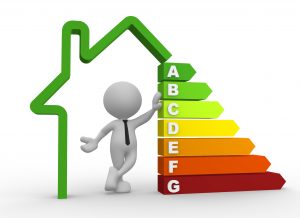 An Energy Performance Certificate (EPC) is a document that provides information about a property’s energy efficiency. It gives a rating from A (most efficient) to G (least efficient) and includes recommendations for improving the property’s energy efficiency. In the UK, it is a legal requirement for an EPC to be available for all properties that are constructed, sold, or rented. This is important because it helps to reduce carbon emissions and decrease energy costs for homeowners. Additionally, it helps buyers and renters make more informed decisions when purchasing or renting a property by providing information about the energy efficiency of the property. This in turn can help to promote sustainable living and reduce the environmental impact of the building stock in the UK.
An Energy Performance Certificate (EPC) is a document that provides information about a property’s energy efficiency. It gives a rating from A (most efficient) to G (least efficient) and includes recommendations for improving the property’s energy efficiency. In the UK, it is a legal requirement for an EPC to be available for all properties that are constructed, sold, or rented. This is important because it helps to reduce carbon emissions and decrease energy costs for homeowners. Additionally, it helps buyers and renters make more informed decisions when purchasing or renting a property by providing information about the energy efficiency of the property. This in turn can help to promote sustainable living and reduce the environmental impact of the building stock in the UK.
The Law is different in Wales
In Wales, the law regarding Energy Performance Certificates (EPCs) is slightly different than in the rest of the UK. Under the Welsh Government’s regulations, all rented properties in Wales must have an EPC rating of at least an E before they can be let. This is stricter than the UK-wide requirement, which only requires an EPC to be available, but does not set a minimum rating. Additionally, the Welsh Government has also introduced a new Minimum Energy Efficiency Standard (MEES) for privately rented properties, which requires landlords to upgrade their properties to a minimum EPC rating of E before they can be let. This will come into effect in April 2023. These regulations are intended to improve the energy efficiency of buildings in Wales, reduce carbon emissions and help to combat fuel poverty.
The benefit to landlords
There are several ways that Energy Performance Certificates (EPCs) can benefit landlords. Some of the main benefits include:
- Cost savings: By identifying areas where a property’s energy efficiency can be improved, an EPC can help landlords to reduce their energy costs. This can be particularly beneficial for landlords with multiple properties.
- Attracting tenants: An EPC rating of A or B can make a property more attractive to tenants, as it demonstrates that the property is energy efficient and that running costs are likely to be lower. This can help landlords to find tenants more quickly and potentially charge higher rent.
- Legal compliance: In Wales, as of April 2023, landlords must have an EPC rating of at least E before they can let their property. This means that landlords need to have an EPC in order to comply with the law and avoid fines.
- Environmental responsibility: By improving the energy efficiency of their properties, landlords can help to reduce carbon emissions and contribute to a more sustainable future.
- Increased property value: Improving the energy efficiency of a property can increase its value, making it more attractive to potential buyers in the future.
In summary, an EPC can help landlords to save money, attract tenants, comply with the law and improve the environment, as well as increase the value of their property in the long run.

Comments are closed.